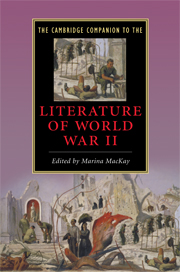2 - British fiction of the war
from Part I - Anglo-American texts and contexts
Published online by Cambridge University Press: 28 May 2009
Summary
It is not an overstatement to say that the writing and reading of fiction was seriously disorientated by the events of the Second World War. The paper shortage meant a reduction in the total number of books published, but as a proportion of that total, there was in any case a considerable drop in the number of novels published. Conversely, there was a proportional increase in the number of short story titles. The short story enabled rapid response to the constantly changing conditions of Phoney War, conscription, Blitz, blackout, evacuation, the housing crisis, and the reorganization of the workforce. Its brevity and capacity for sharp focus made it more suitable as a means of reflecting disruptions in the rhythm of everyday life and a profound sense of historical discontinuity. Both in form and content, the short story was the medium of choice for conveying a shared experience of fragmentation, unpredictability, and the psychological stress of having to live from moment to moment. Elizabeth Bowen was quite clear about the historical role of short fiction at this time and of the necessity to defer the writing of novels until after the war had finished: “When today has become yesterday, it will have integrated.” Those novels that were written and published during the war often gravitated towards the problem of integration, often specifically towards the challenge of grasping the imaginative, if not the practical, means of maintaining the continuity of British traditions, customs, and ideas about identity, at a time of historical irresolution.
- Type
- Chapter
- Information
- Publisher: Cambridge University PressPrint publication year: 2009

